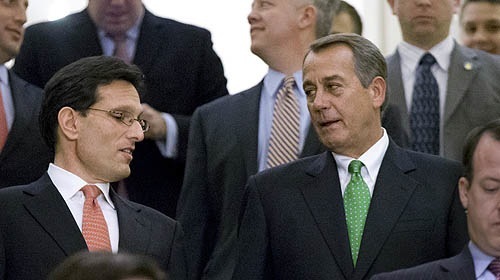
“So the priest says—hang on. If you want to hear the rest of the joke, give me ten dollars right now.”
According to a Politico report that has scared hell out of the nation and briefly thrown me into agreement with Ross Douthat, a substantial number of House Republicans are considering refusing to raise the debt ceiling. The plan is to use the threat of default and/or federal shutdown to force Obama to agree to spending cuts—cuts he has repeatedly refused to make. That part of the story should be eerily familiar from last year, when maneuvering over the debt ceiling ended in the downgrade of the credit of the United States. Everyone agreed that was a disaster, both for the union and for the Republican caucus. This year, though, will be totally different. Alarming quote after the jump.
I think it is possible that we would shut down the government to make sure President Obama understands that we’re serious. We always talk about whether or not we’re going to kick the can down the road. I think the mood is that we’ve come to the end of the road.
That’s House Republican Chairwoman Cathy McMorris Rodgers, worrying that the president does not realize Republicans really want to cut spending. But they are serious, in the sense that they are seriously interested in getting their way. If you mean serious in the other sense—as in “concerned with possible danger or risk”—House Republicans are Steve-O. According to Politico, Republican House leaders have reported that much of their caucus regards it as “far riskier long term to pile up new debt than it is to test the market and economic reaction of default or closing down the government.”
Let us consider that statement, because in it lurks the absolute triumph of ideology. The GOP has already “test[ed] the market and economic reaction of default or closing down the government.” We flirted with default last year, and the result was the aforementioned downgrade, plus a continuation of the lowest approval ratings Congress has seen in decades. A similarly-controlled House shut down the federal government under Clinton, and that is almost universally regarded as a political blunder.
As Pete Wehner observed, the contemporary Republican Party has made its strongest gains not after shutdowns and other dramatic confrontations with the White House, but after periods of Democratic overreach. His theory that the GOP enjoys its biggest improvements after Democrats control large portions of Congress contains a tautological flaw, but his argument that precipitating a crisis doesn’t work is backed by historical evidence.
They did it last year, for Pete’s sake, but a substantial number of House Republicans insist that we just don’t know what will happen if we default and/or shut down the federal government. Meanwhile, they remain certain of the consequences of ongoing debt. I believe my record will indicate that I regard the federal budget deficit as a problem, but recent history also indicates that we can, in the words of McMorris Rodgers, “kick the can down the road.”
We’ve been doing it for over a decade. We cannot do it for a century, but the last twenty years provide concrete evidence of what happens when we shut down the government, use the debt ceiling as a bargaining chip, and run significant deficits. Two of these items hurt the nation and/or the Republican Party, and one of them is either a bad habit with potential long-term consequences or an immediate threat worse than having no government at all.
In the face of plenty of evidence to the contrary, substantial numbers of our elected representatives are certain it’s the latter. The obstinacy is the result of an ideology that postulates big government and public debt as the worst things that can possibly happen to a nation—and of a politics that rewards ideology over actual competence.
No one is arguing that defaulting on the debt or shutting down the government would actually help America. Its practical outcomes are all cons, and the pros are such vague notions as “showing the president we’re serious” and “taking a stand.” The only good thing about this plan is that it will constitute a pious declaration of orthodoxy from those who follow it. Something is wrong with a politics that makes that gesture more valuable to congressmen than the full faith and credit of the United States.




Current Republicans are making me yearn for the good ol’ days of greased palms and backdoor deals. This new strategy, perhaps due to the ban on earmarks and the shift in Congressional ideological makeup (http://xkcd.com/1127/large/), of fuck shit up as publicly as possible seems less preferable.
I suppose it’s a worthwhile [not-so]hypothetical question to discover one’s values. If Congress’s legislative behavior were to reflect less the wants and character of the people and were more a white man’s business club, but that ensured they worked together, would you want that trade-off?
I want to add, for posterity, that the way I phrased my question may imply I believe Congress is at least partly failing due to increased race and gender diversity within its ranks. That’s not the case. I just dashed it off and then ran for a bus.
That said, I don’t have much other than some straws in hand to explain this ideological as shown in the xkcd visualization. …Gerrymandering…
this ideological shift*